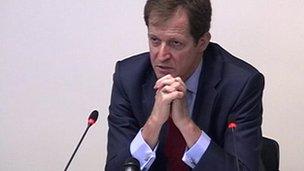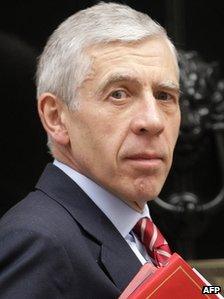Leveson Inquiry: Summary of week 20
- Published

Alastair Campbell made his second appearance at the Leveson Inquiry
Appearances by political heavyweights Alastair Campbell and Jack Straw, and Lord Justice Leveson handing out a warning to MPs, were among the main events at the Leveson Inquiry this week.
On Monday, <link> <caption>Tony Blair's former press secretary Alastair Campbell told the inquiry</caption> <url href="http://www.bbc.co.uk/news/uk-18055381" platform="highweb"/> </link> that there was no "express deal" between Mr Blair and Rupert Murdoch in the run-up to the 1997 election.
Mr Blair's former press secretary was asked about the backing of Labour in 1997 by the media mogul's Sun newspaper.
Asked if there was evidence of a deal, Mr Campbell said: "Absolutely not."
He said he and Mr Blair sometimes felt "distaste" when dealing with News Corporation chairman Mr Murdoch.
Mr Campbell, making his second appearance at the inquiry, said it would have been "lacking good sense" not to have developed a relationship with Mr Murdoch.
Appearing on Monday morning, ex-Cabinet Secretary Lord Gus O'Donnell said former News of the World editor Andy Coulson should have declared News Corporation shares when he was the press chief to Prime Minister David Cameron.
Mr Coulson told the inquiry the previous week that he considered a possible conflict of interest over the £40,000 shares only after he quit his Downing Street role in January 2011.
<link> <caption>Tuesday saw Lord Justice Leveson warn Parliament</caption> <url href="http://www.bbc.co.uk/news/uk-18069612" platform="highweb"/> </link> to delay publishing papers about Culture Secretary Jeremy Hunt's handling of News Corp's bid to take full control of satellite broadcaster BSkyB.

Jack Straw said Rupert Murdoch enjoyed playing a "power game"
He said this should wait until the issues surrounding Mr Hunt's links to the company were addressed by the inquiry.
Labour later withdrew parliamentary questions calling for the culture secretary to give evidence to the Commons.
On Wednesday it was the turn of <link> <caption>former home secretary and foreign secretary Jack Straw to give evidence</caption> <url href="http://www.bbc.co.uk/news/uk-18085006" platform="highweb"/> </link> .
He told the inquiry that Rupert Murdoch enjoyed playing a "power game" with politicians.
Mr Straw said Mr Murdoch appeared to wield more power than executives at other newspapers.
The Labour MP also described relationships between politicians and journalists as "incestuous" in some cases.
The week's proceedings came to an end on Thursday when <link> <caption>the Daily Telegraph's chief political commentator Peter Oborne appeared</caption> <url href="http://www.bbc.co.uk/news/uk-18107297" platform="highweb"/> </link> .
He told the inquiry that News International (NI) executives briefed David Cameron on "what to say and how to say it" before he first met Rupert Murdoch.
But Mr Oborne said an unnamed NI employee was shocked when Mr Cameron "wouldn't play ball".
Mr Oborne said Mr Cameron's strategy in his early days as Conservative leader was to treat the Murdochs and their staff no different to anyone else.
On Friday, <link> <caption>it was announced that Mr Hunt's former special adviser Adam Smith</caption> <url href="http://www.bbc.co.uk/news/uk-18118611" platform="highweb"/> </link> and News Corp lobbyist Frederic Michel were among those scheduled to appear at the inquiry the following week.
Mr Smith resigned last month over his contacts with Mr Michel relating to News Corp's BSkyB bid.